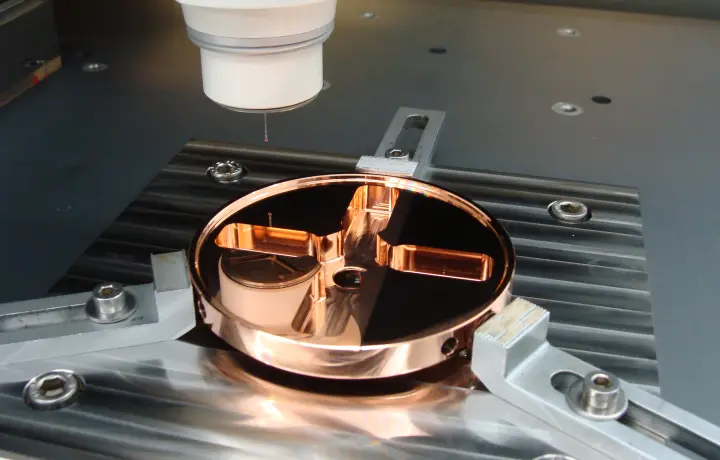- Engineering
- Measuring systems
- Machine qualification
-
Components
-
Systems
-
Learn more
-
- Expertise
- About IBS

Further to its in-house programmes, IBS Precision Engineering partakes in a range of international projects spearheading solutions to next generation measurement challenges for industry and academia
The ability to take an idea or prototype and transform it into a manufacturable product is one of the most essential steps in the innovation process. At IBS Precision Engineering, leading mechanical design, system and software architecture capability is combined with our firm roots in metrology. You can find examples of our R&D projects including links to the project descriptions below:
The demand for low latency, high capacity, secure and uninterrupted internet connectivity anywhere in the world at any time has resulted in explosive growth in the satellite communications market. This market requires sensors that are capable of measuring highly repeatable tilting motions with high resolution and bandwidth. These sensors are being developed for use in Fine Steering Mirrors (FSM) to enable ground, airborne and satellite optical communications over long distances between two terminals.
High accuracy is required for successful communication over such long distances. The requirements for the FSM are quite demanding in meeting the required pointing performance and should be small in size, weight and power. The FSM will be feedback controlled using two differential eddy current sensors.
In this project IBS will focus on developing differential sensors which can be used for controlling the FSM. These sensors will be high precision with high bandwidth, small form factor, weight and power consumption.
The positioning accuracy of linear or rotary motors for precision mechatronics is typically limited by friction and parasitic forces due to, for example, electromagnetics. Compensation of parasitic forces by intelligent control algorithms is potentially more cost effective than hardware solutions and easier to make machine specific. However, state-of-the-art data-driven intelligent control methods commonly use multi-layer feedforward neural networks, which are likely to malfunction in the presence of real data and are too complex for implementation in fast mechatronics systems. This AI project will address how to design data-driven intelligent controllers that can meet industrial high-precision mechatronics specifications regarding positioning accuracy, robustness and real-time implementation.
Within the project IBS is responsible for using the error assessment data to improve the accuracy of 5-axis machines.
Medical treatments are increasingly tailored to customers’ needs and wishes and aimed at shortening waiting and treatment periods. In dentistry, this trend will offer possibilities for dentists to mill custom-made prostheses and crowns for their customers in (or near) their own practice within a short period of time. At this moment, however, it is not yet possible to achieve sufficient accuracy to make the prostheses and crowns immediately usable. A finishing step (polishing) is still necessary, which requires extra time and commitment from third parties. High-quality measuring technology will be necessary to realize and guarantee sufficient accuracy that does not require an extra polishing step.
For this project IBS develops an innovative new measuring system: the miniature Rotary Inspector. Its big brother has made it possible to automatically measure the accuracy of a 5-axis machine in a short period of time. The small-format system will be ideal for dentistry.
IBS sees opportunities in other markets as well. Specifically, for the next generation of jet engines, IBS has been asked to develop a measurement technique for integration into an additive manufacturing process that is used to produce complex composite parts for aviation.
SmartLine is an ambitious H2020 FOF project that will create intelligent and zerodefect manufacturing processes by developing robust and non-destructive in-line metrology tools (optical, electrical, structural) and process control platform to achieve the reliable and closed-loop manufacturing of Organic Electronic devices (OPVs and OLEDs for lighting) by unique R2R printing and OVPD pilot lines.
Within SmartLine, IBS is developing inline optical interferometry to enable real time process control for OPV manufacturing.
NANOMEND developed pioneering technologies for in-line detection, cleaning and repair of micro and nano scale defects for thin films coated on large area substrates. Examples include films used in the production of packaging materials, flexible solar panels, lighting, digital signage and displays.
In collaboration with the University of Huddersfield UK, IBS developed an optical interferometry system which delivers fast and high precision areal surface measurements suitable for particle measurement on foils as well as stepped and freeform micro-nanoscale structures.
MIDEMMA addressed the minimisation of defects in micro-manufacturing. Implementing a full process monitoring, 'zero defect' approach, it set out to improve micro-manufacturing by:
IBS developed a nanometer resolution 3D probe which may be integrated onto ultra precision machine tools. This new probe enables measurement of ultra precision freeform structures, of growing importance to industry.
This EU-funded project targeted contamination and defect control in roll-to-roll organic electronics production – ensuring high yields for cost-effective manufacturing. To this end, the partners developed new technologies for inspecting, cleaning and repairing moving foils, for large-scale roll-to-roll production of OLEDs and OPVs.
IBS Precision Engineering developed technologies for contactless roll-to-roll transport with ultra precision positioning control. IBS also developed a contactless cleaning system for particle removal from foils for next generation printed electronics.
ProDuZo (Production of Thin Film Solar Cells) is a project which has addressed new production processes for Thin Film Solar Cells. Its focus has been the achievement of high precision back end interconnection on thin film photovoltaics.
IBS has developed a module for real-time monitoring and measurement of thin film solar cell production at micron overlay accuracy. Combining the measurement data with visual information, a complete overview of the system accuracy and process parameters is given.